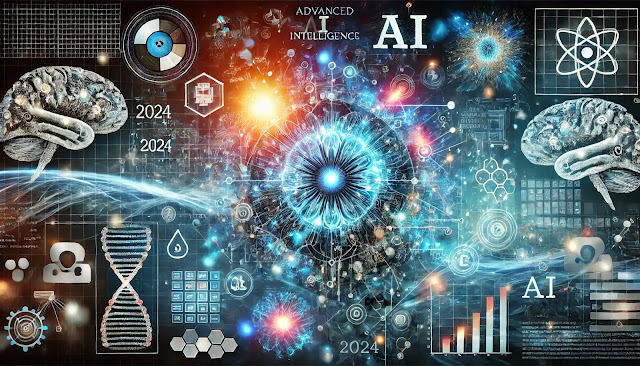The Potential of Generative AI in Healthcare
Generative AI is making waves in various fields, and healthcare is no exception. From predicting patient outcomes to designing personalized treatment plans, the potential applications are vast and promising. This blog post delves into the fascinating ways generative AI is transforming healthcare, highlighting its benefits, challenges, and future prospects.
The Current Landscape of AI in Healthcare
Before diving into generative AI, it’s essential to understand the broader context of AI in healthcare:
- Diagnosis Assistance: AI algorithms analyze medical images and assist in diagnosing conditions such as cancer, diabetic retinopathy, and more with high accuracy.
- Predictive Analytics: AI models predict patient outcomes based on historical data, aiding in early intervention and improved patient care.
- Administrative Automation: AI streamlines administrative tasks, from scheduling appointments to managing patient records, reducing the burden on healthcare staff.
What is Generative AI?
Generative AI refers to AI systems that can create new content, such as images, text, music, and even complex data sets. In healthcare, generative AI can:
- Generate synthetic medical data for training other AI models.
- Design novel drug molecules by predicting molecular structures with desired properties.
- Create personalized treatment plans based on individual patient data.
Key Applications of Generative AI in Healthcare
1. Drug Discovery and Development
Generative AI has the potential to revolutionize the drug discovery process, which is traditionally lengthy and expensive:
- Molecule Generation: Generative models can predict and design new molecules with specific therapeutic properties, significantly speeding up the initial phase of drug discovery.
- Optimization: AI can refine and optimize drug candidates, ensuring they meet all necessary criteria before clinical trials.
Example: Researchers have used generative models to design new antibiotics that can combat resistant bacteria, a critical need in modern medicine .
2. Personalized Medicine
Every patient is unique, and generative AI can help tailor treatments to individual needs:
- Genetic Data Analysis: AI models analyze genetic data to predict how patients will respond to different treatments, enabling personalized therapies.
- Customized Treatment Plans: By considering a patient's medical history, lifestyle, and genetic profile, AI can suggest the most effective treatment options.
Example: AI-driven platforms are being developed to create personalized cancer treatment plans, improving the chances of successful outcomes .
3. Medical Imaging
Generative AI can enhance and analyze medical images, providing valuable insights for diagnosis and treatment:
- Image Enhancement: AI algorithms can improve the quality of medical images, making it easier for radiologists to detect anomalies.
- Synthetic Image Generation: AI can generate synthetic images for training other AI systems, helping to overcome the challenge of limited annotated medical data.
Example: Generative adversarial networks (GANs) have been used to create high-resolution images from low-quality scans, assisting in more accurate diagnoses .
4. Virtual Health Assistants
Generative AI powers virtual health assistants that provide round-the-clock support to patients:
- Symptom Checking: AI assistants can analyze symptoms reported by patients and suggest potential causes or actions.
- Mental Health Support: AI-driven chatbots offer support and therapy for mental health issues, providing immediate help and reducing the burden on human therapists.
Example: Virtual assistants like Woebot use generative AI to engage in meaningful conversations, offering cognitive-behavioral therapy (CBT) to users .
Benefits of Generative AI in Healthcare
Improved Accuracy and Efficiency
- Enhanced Diagnostic Accuracy: Generative AI models can process and analyze vast amounts of data, leading to more accurate diagnoses.
- Streamlined Processes: Automation of routine tasks allows healthcare professionals to focus on patient care.
Cost Reduction
- Lower Research Costs: AI reduces the cost of drug discovery and development by speeding up the process and increasing the success rate.
- Operational Savings: AI-driven automation lowers administrative costs, contributing to overall savings in healthcare expenditure.
Accessibility
- Telemedicine: Generative AI enables the delivery of healthcare services remotely, making healthcare accessible to people in underserved areas.
- Personalized Care: AI ensures that patients receive tailored treatments, improving outcomes and patient satisfaction.
Challenges and Considerations
While the potential of generative AI in healthcare is immense, several challenges need to be addressed:
Data Privacy and Security
- Patient Data Protection: Ensuring the privacy and security of patient data is paramount. Robust encryption and data protection measures are essential to prevent breaches.
Ethical Concerns
- Bias and Fairness: AI models must be trained on diverse datasets to avoid biases that could lead to unfair treatment recommendations.
- Transparency: The decision-making process of AI models should be transparent to ensure trust and accountability.
Regulatory Hurdles
- Approval Processes: Regulatory bodies must develop frameworks to evaluate and approve AI-driven medical tools and treatments.
- Compliance: AI solutions must comply with existing healthcare regulations, such as HIPAA in the United States, to ensure patient safety and privacy.
The Future of Generative AI in Healthcare
The future of generative AI in healthcare looks promising, with several exciting developments on the horizon:
Integration with IoT and Wearables
- Continuous Monitoring: Combining AI with wearable devices will allow for continuous health monitoring and real-time data analysis, enabling proactive healthcare management.
Advanced Predictive Models
- Early Disease Detection: AI models will become increasingly adept at predicting diseases before symptoms appear, leading to earlier interventions and better outcomes.
Enhanced Human-AI Collaboration
- Support for Healthcare Professionals: AI will serve as a valuable tool for healthcare professionals, providing insights and recommendations while allowing them to make the final decisions.
Example: Hospitals are starting to integrate AI systems that assist doctors in making complex diagnoses, improving both speed and accuracy of patient care .
Conclusion
Generative AI holds incredible potential to transform healthcare, from drug discovery to personalized medicine and beyond. As we navigate the challenges and embrace the benefits, the integration of generative AI into healthcare promises a future where patient care is more accurate, efficient, and accessible than ever before.





Comments